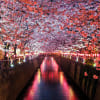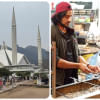Stepping onto the streets of Asia is like entering a realm where history and tradition meet technology and modernity. From the bustling heart of Vietnam to the tranquil lanes of Malacca, we extend a heartfelt invitation to join us on this journey through Asia's five most spellbinding streets.
The Philosopher's Walk, Kyoto, Japan
The Philosopher's Walk, also known as "Tetsugaku-no-Michi" in Japanese, is arguably the most beautiful street in Kyoto. Named after the famous philosopher Nishida Kitaro, this scenic street in Japan follows the banks of the Biwa Canal and winds its way through the Higashiyama district.
A walk down this road offers outstanding views of the surrounding Higashiyama Mountains and temples, such as Ginkaku-ji and Nanzen-ji. Visitors will also find several small art galleries, boutiques, and cafes to occupy themselves in a late afternoon stroll.
The Philosopher's Walk offers the most during the cherry blossom. As the 'Sakura' (cherry blossom) approaches, the street turns into a tunnel of vibrant pink and white, making it the most prominent location in the city for 'Hanami' (cherry blossom viewing).
For a walk of contemplation and reflection on this Philosopher's Walk, just hop on a city bus to the Ginkaku-ji (Silver Pavilion) bus stop for the northern entrance or to the Jodo-ji bus stop for the southern entrance of the road.

Nguyen Hue Walking Street, Ho Chi Minh City, Vietnam
Located in the central district (District 1) of Ho Chi Minh City, the Nguyen Hue Walking Street is one of the city's most iconic and festive locations. With a designated pedestrian area, the street restricts vehicular traffic at specific times, allowing visitors to immerse themselves in the mesmerising performances by various street artists and exhibitions.
Along this road, you will encounter a striking musical fountain, and most of the city's prominent landmarks are conveniently situated nearby, making it an ideal destination for an enchanting and leisurely walking experience.
Throughout the year, this street becomes a lively host for numerous cultural events and festivals, yet the Lunar New Year, also known as Tet, stands out as the most renowned celebration.
During Tet, the street undergoes a remarkable transformation, enchanting tourists with a symphony of colourful lights and dazzling decorations, turning it into an absolute spectacle to behold.

Fontainhas, Goa, India
Fontainhas, situated at the heart of Panaji, Goa's capital, is a picturesque and historically rich district also known as the 'Latin Quarter.' This area is known for its Portuguese architectural influences, meandering narrow streets, and vivid colours that distinguish it from other parts of Goa. Notably, it stands as one of the rare places where the Indo-Portuguese architectural legacy, shaped by centuries of Portuguese colonial presence, has been meticulously preserved.
The charming houses, distinguished by their colourful walls, red-tiled rooftops, wrought-iron balconies, and artistic window grilles, feature a captivating fusion of European and Indian design elements. Additionally, the narrow roads of Fontainhas offer a fascinating culinary journey, where you can enjoy authentic Goan and Portuguese flavours at local restaurants, with dishes like vindaloo, bebinca, sannas, and Goan red rice on the menus.
As you explore this vibrant neighbourhood, you will discover an array of street art and murals that enhance its artistic allure, creating a picturesque haven for photography enthusiasts.
Take any bus bound for Panaji, and a small walk from the station can take you to this historic neighbourhood of India.
Jonker Street, Malacca, Malaysia
Also known as Jalan Hang Jebat, Jonker Street stands as one of the most popular and well-visited streets in the historic city of Malacca, Malaysia. Nestled within the old city, a UNESCO World Heritage Site, this street has gained renown for its historical significance, rich cultural legacy, and distinctive architectural charm.
The street is famous for its numerous antique shops, boutiques, and art galleries. Yet, when the sun sets every Friday and Saturday, the street comes to life and transforms into a vibrant night market offering a wide range of ethnic collectibles and souvenirs.
Simultaneously, it evolves into a haven for food lovers, featuring various street food stalls and restaurants that serve up authentic Malaysian and Peranakan cuisine. Be sure to try out local delicacies like laksa, rice balls, satay celup and cendol, among others, as you savour the diverse flavours that define this enchanting destination!

The Bund, Shanghai, China
The Bund, an iconic waterfront in Shanghai, is celebrated for its unique architecture, and its role as a symbol of the city's rich historical legacy and its dynamic present. This beloved destination offers a spacious promenade that stretches along the riverbank, providing a leisurely escape for walks and jogging while enjoying the enchanting views of the Shanghai skyline. The area is thoughtfully adorned with benches and small gardens, creating a serene and comfortable ambience for visitors to savour.
Notably, the Bund promenade also features several statues and sculptures, including iconic landmarks like the "Statue of Chen Yi" and "The Bund Bull," offering excellent opportunities for photography enthusiasts.
Moreover, The Bund's fame extends to its diverse architectural landscape. The buildings gracing the side of the road are a splendid mosaic of Neoclassical, Gothic, Renaissance, and Art Deco styles. As night falls, many of these architectural marvels come aglow, enhancing the area's enchantment with their beautifully illuminated facades.
Using the extensive metro system of Shanghai is the most convenient way to reach this destination. The East Nanjing Road Station is the nearest to the Bund and it's a short walk to the promenade from there.








Comments